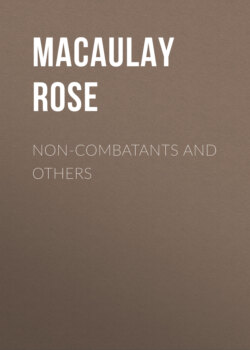Читать книгу Non-combatants and Others - Macaulay Rose - Страница 14
На сайте Литреса книга снята с продажи.
2
ОглавлениеThey were at dinner. Alix sat opposite John, who wore a dinner jacket again, as if there were no war. He looked brown and square and cheerful. Between the daffodils Alix saw his eyes, nervous and watchful, with the look in them that was in so many young men's eyes in these days. Next him was Mademoiselle Verstigel, stolid, placid, eating largely, saying little.
Mr. Orme spoke of the big advance that they all believed was coming directly.
'Not yet,' said John. 'N-not enough shells.'
'Wish I could go and help make some,' said Margot.
They all discussed the munitions question. John had strong views on it, differing in some particulars from his father's. John related the inner history of several recent episodes of war, to support his view. He was very interesting. John was not naturally an anecdotal person, but his mind had been of late stored and fed with experiences. Some officers are reduced by trench life to an extreme reticence; the conversational faculty of others is stimulated. Nervous strain works in both of these ways, often in the same person. Anyhow John had to talk about the war to-night, because at Wood End they all did. He answered his father's questions about barbed wire, his mother's about dug-outs, his sisters' about things to eat. They asked him all the things they hadn't liked to ask him while he was in hospital for fear of setting his brain working and retarding his recovery. Dorothy wanted to know if it was true what the men said, that their bully beef often climbed out of its tin and walked down the trench. John said it was not, and that it was one of the erroneous statements he had most frequently to censor in the men's letters. Margot wanted to know what sort of meals he had in the trenches. John said mess in the dug-out usually consisted of six courses (preceded by vermuth), three drinks, and coffee. He proceeded to describe the courses in detail.
His mother wanted to know about the nights, whether he got any sleep. John said yes, quite a lot, when it didn't happen to be his watch. What about the noise? his mother asked. Had he got at all used to it yet? John said it wasn't nearly so noisy as the Royal Free Hospital, where he had spent the last month. His father asked what he thought of the German soldiers as clean fighters. John said they seemed much like anybody else, as far as he'd noticed. Mademoiselle Verstigel, understanding this, shook her head in protest. His mother asked, did he think it was true that our Tommies were learning to pray, or was the contrary statement truer, that they were losing such faith as they had? John said he had not himself noticed either of these phenomena in his platoon, but he might, of course, ask them. His father, who was interested, both as a person of intelligence and as a man of business, in the Balkans, got there, and they discussed the exhausting and exhaustive topic of those wild and erratic states, the relations of each to other, to the Central Powers, to the Allies, and to the war, at some length. It was the period when people were saying that Greece would come in for us, that Rumania might, and that it was essential to collar Bulgaria. So they said these things duly.
